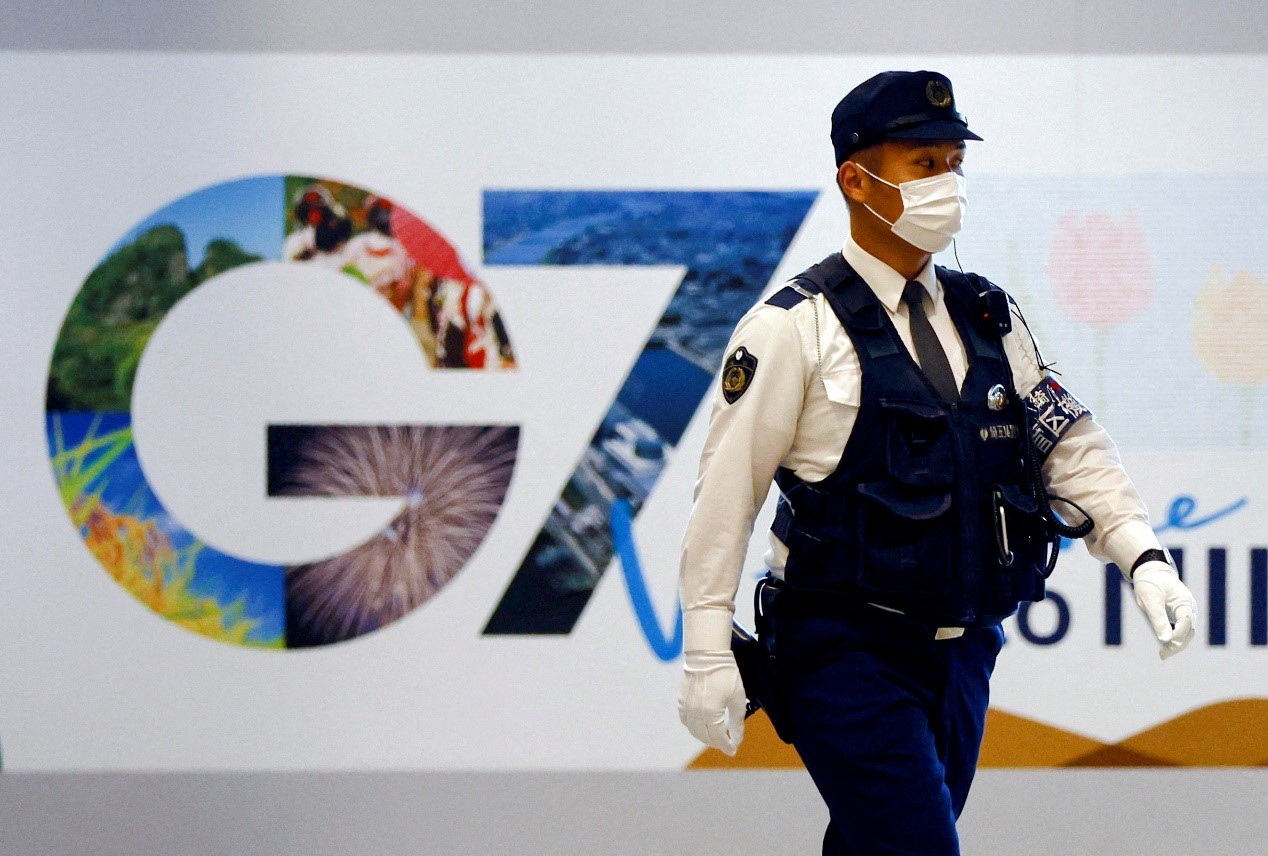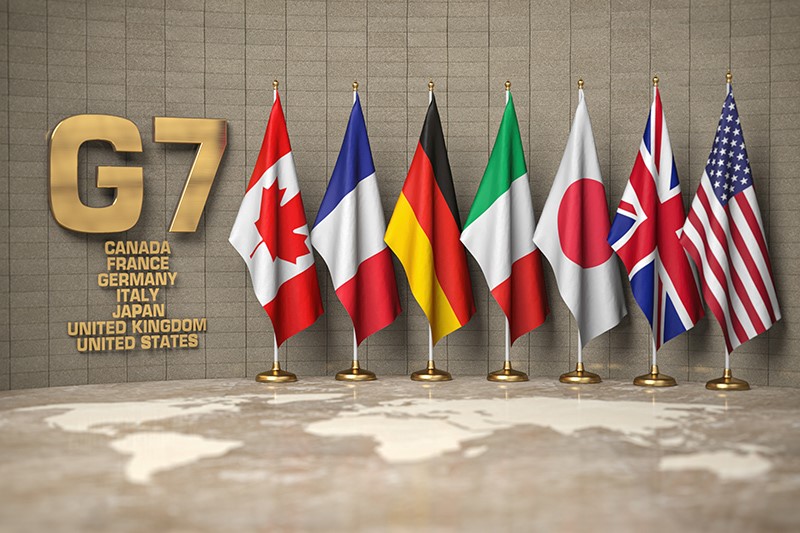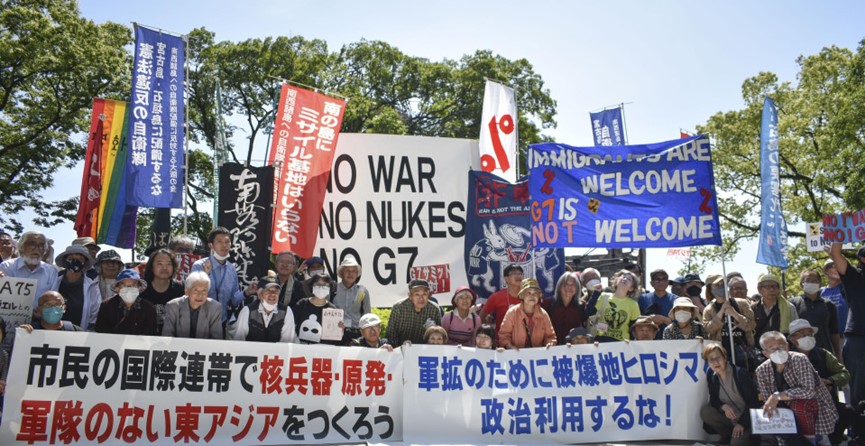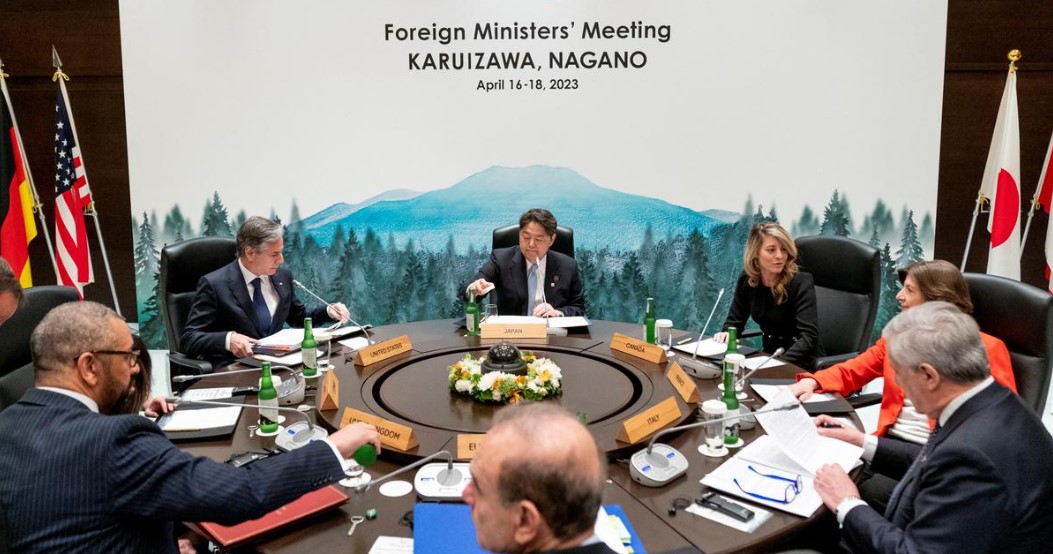5月19-22日,七国集团(G7)峰会将于日本广岛举行。此前,G7还分别举行了外长会、气候部长会和财长及央行行长会。今年G7系列会议重点涉及乌克兰危机、中国、朝鲜、印太战略等多项议题,体现出G7对亚太地区的强烈关注;其基调也延续了西方霸权和冷战思维,其系列主张将加剧地缘政治竞争,对解决地区和国际和平与安全问题、促进世界经济复苏缺少建设性作用。一、七国集团冷战思维作祟,挑动阵营对立,极力打压俄罗斯和中国。1.七国集团外长会议聚焦乌克兰危机和中国持续增强的地区影响力,强调提高对俄罗斯的制裁力度,反复表达对中国东海、南海形势以及台湾海峡现状的“关切”,此举再次暴露出七国集团冷战思维作祟、热衷于搞“小圈子”、挑动地区矛盾和阵营对立。From April 16 to 18, foreign ministers (FMs) of the G7 countries are meeting in Nagano, Japan, to discuss the agenda of the G7 leader summit to be held next month in Hiroshima.According to a draft joint statement obtained by NHK, the national TV channel of Japan, the G7 FM meeting this year is focusing on the Ukraine crisis, as well as "growing Chinese regional assertiveness."Apart from criticism of Russian actions in Ukraine, accusing Russia of spreading disinformation, and calling on third parties to support anti-Russia sanctions, the joint statement also includes several recurring themes from last year. Key issues mentioned in the statement are "commitment for a free and open Indo-Pacific," "concerns about the situation in the East and South China seas," and "stress for peace and stability across the Taiwan Straits," as well as "opposition to any unilateral attempts to change the status quo by force or coercion."Such contents, if finally taken in as the formal joint statement of the G7 FM meeting 2023, would doubtlessly expose that G7 are unable to assume their responsibility for addressing global challenges and promoting world economic recovery.On the contrary, their Cold War mentality, enhanced by their obsessiveness over the identity as advanced Western countries superior to the rest of the world, has driven them further away from the positive global leading role they desired and made them nothing but a "small clique" aloof from, and of no help for, the real needs of most countries in the world.(April 17, 2023. “Did G7 become a showcase for Western hubris?”, CGTN)One thing was in sufficient supply at this week's Group of Seven (G7) foreign ministers' meeting in the Japanese resort town of Karuizawa: untenable accusation.The rich club stressed the need to caution against what they called Chinese "threats, coercion, intimidation, or the use of force" in East and South China Seas, notably over Taiwan, in a communique Tuesday. G7 again used a "lofty" pretext to interfere in China's internal affairs and discredit China.Those arrogant wealthiest countries have repeated such cliches over and over again. Yet they are wrong about the status quo at the beginning.There is only one China and both sides of the Taiwan Straits belong to one and the same China. This has been the status quo of Taiwan since ancient times. The Government of the People's Republic of China is the sole legal government of China and Taiwan is part of China. This is the status quo across the Taiwan Straits that has been there for decades.Given that the one-China principle is a prevailing consensus among the international community and a basic norm in international relations, the Taiwan question is China's internal affair in which the G7 is in no position to interfere in.
The communique indeed indicated that "there is no change in the basic positions of the G7 members on Taiwan, including stated one China policies." But deeds fail to match words. The United States plans to sell as many as 400 land-launched Harpoon missiles to Taiwan, in the latest sign that some in America intend to use Taiwan to contain China. And those acts and words are sending wrong signals to the "Taiwan independence" forces.
The Taiwan question is at the very core of China's core interests. Those who choose to support or even collude with "Taiwan independence" separatists are violating, far from upholding, the one-China principle, and endangering cross-Strait peace and stability.
While meddling in China's internal affairs, the G7 nations also acknowledged the need to work together with China on global challenges, including on climate change, biodiversity, global health security and gender equality.
However, the communique, also with smears against China on Xinjiang, Tibet, Hong Kong and the East and South China Seas, is full of arrogance, prejudice and sinister intentions, exposing a Cold War mentality and ideological prejudice.
(April 19, 2023. “Xinhua Commentary: G7 gets it wrong again on Taiwan question”, XINHUA)
2.美国力推七国集团峰会发表指责中国“经济胁迫”的声明。但事实上,所谓经济胁迫恰恰是美国及其盟友惯用的伎俩。美西方对别国任意实施经济制裁,非但无助于问题的解决,还促使通胀居高不下、产业链供应链受到严重冲击,给疫情后全球经济复苏带来巨大阻力。美国甚至对其盟友也实施经济胁迫。在如何保持同中国的经贸关系问题上,七国集团国家间也存在一些分歧。After exhausting the means to coerce China via its own economic and trade exchanges with China, the US is now eyeing those between its allies and China as a way of bolstering the power of its blows.Both the bill itself and the preset agenda for the G7 Summit serve to show that it is the US that is resorting to "economic coercion" to achieve "strategic political objectives or influence sovereign political actions" through "actions, practices, or threats" that are undertaken to "unreasonably restrain, obstruct, or manipulate trade, foreign aid, investment, or commerce with the intent to cause economic harm", as the bill unintentionally clarifies.If any country is cause for concern because of its economic coercion, it is the US. It has been overstretching the concept of national security, abusing exports control and taking discriminatory and unfair measures against foreign companies of different countries. Not even G7 members have been spared from US economic coercion and bullying.If the G7 Summit is to discuss a response to economic coercion, it should first discuss its response to that of the US.(May14, 2023. “US aims to ramp up its economic coercion: China Daily editorial”, China Daily)While Japan’s call for the need to maintain a rules-based international order resonates with a country like Australia, it is more challenging convincing poorer nations who benefit economically from trading with Russia to denounce Moscow.Developing nations in parts of Asia, Africa and Latin America are also critical of the United States and its allies for imposing its beliefs on others.“Changing the attitudes of these countries will not be easy. On the contrary, there is a risk that the pro-Russian stance will be strengthened in the future,” Nomura Research Institute executive economist TakahideKiuchi warns.“Many of these countries believe that economic sanctions against Russia by developed countries are pushing up energy and food prices and causing economic damage to their own countries.“In order to change the stance of these countries, it is necessary for developed countries to make efforts such as strengthening economic support that is practical, rather than the ideology of ‘human rights’ and ‘democracy’.”(May8, 2023. “Japan seeks new allies in G7’s China pushback”, FINANCIAL REVIEW)China is much on the minds of G7 finance leaders gathering in the Japanese city of Niigata, with current G7 chair Japan leading fresh efforts to diversify supply chains and reduce their heavy reliance on Beijing.But the group is not on the same page in terms of how far it should go in countering China, as hurting trade with the world's second-largest economy could deal a heavy blow to export-reliant countries such as Germany and Japan.(May 12, 2023. “G7 finance heads face tricky trade-off in debating steps to counter China”, REUTERS)The G7 countries, however, were understood to have differed on how far to go to countering China.While US Treasury Secretary Janet Yellen and British Chancellor Jeremy Hunt have said that the G7 must lead efforts to counter “economic coercion” by Beijing of countries that it is not happy with, Germany has been cautious of forging a G7 front against China.In Beijing, Chinese Foreign Ministry spokesman Wang Wenbin told a regular news conference on Thursday: “To put it bluntly, the international rules that the G7 talks about are Western values and ideologies, and the rules of a small clique that puts the US first.”He added: “The G7 demands that China abide by international rules, but it is a representative of those who violate and break international rules.”
(May 13, 2023. “China, Russia loom large over G7 finance ministers’ Niigata meeting”, The Straits Times)
“It's very difficult to leave China out given its economic might,” said Toru Nishihama, chief emerging market economist at Dai-ichi Life Research Institute. “Doing so could divide world trade, damage global growth and hurt G7 economies themselves.”
(May 12, 2023. “G7 finance heads face tricky trade-off in debating steps to counter China”, REUTERS)
二、七国集团加剧地缘政治竞争,威胁欧洲和亚太地区安全与稳定
1. 七国集团已成为相关国家进行大国竞争的工具。七国集团成员中6个来自北约,日本也正积极向北约靠拢,而北约扩张恰恰是导致乌克兰危机的重要原因。从本质上看,七国集团已成为某些国家谋求在大国竞争中胜出的工具。由于其推动阵营对立、干涉地区事务和他国内政,七国集团事实上已成为威胁欧洲和亚太地区安全与稳定的重要因素。
Six out of G7 countries are members of NATO, with Japan actively approaching NATO in recent years. It was NATO's desire to expand its sphere of influence that deteriorated the geopolitical competition in Europe, leading to the Ukraine crisis today. To omit such sophisticated background and focus one-sidedly on condemning Russia indicates G7's double standard on this issue.Moreover, it is difficult not to notice the hypocrisy considering the shift of strategic focus to "great power competitions" of certain related countries in recent years, and their ardent endeavors for taking an advantageous position in power struggles against Russia.(April 17, 2023. “Did G7 become a showcase for Western hubris?”, CGTN)The West seems to be at its wit's end regarding sanctions against Russia. It now even seeks a kamikaze-like ban on Russia to increase the suppression, depriving the world of a possible earlier end to the crises and war.(April 24, 2023. “G7's kamikaze-like export ban on Russia undermines prospect of peace”, Global Times)2. 七国集团屡屡对地区事务和他国内政横加干涉和指责。今年七国集团外长会议联合公报,对中国南海和东海局势表示“强烈关切”,对中国新疆、西藏、香港等内政问题指手画脚。还对朝鲜弹道导弹发射表示“强烈谴责”。The G7 has ignored China's position, disregarded facts, "grossly" interfered in China's internal affairs, and "maliciously" slandered and discredited China, said Wang Wenbin, a spokesperson for the Chinese Foreign Ministry, at a regular press briefing in Beijing.Wang said, China expresses its strong dissatisfaction with and resolute opposition to this, and has made solemn representations to Japan, which hosted a three-day meeting of the G7 foreign ministers.In a joint statement released earlier Tuesday after the meeting held in central Japan, the G7 top diplomats reaffirmed what they said was "the importance of peace and stability across the Taiwan Straits" and expressed so-called concerns over the East China Sea, the South China Sea, and China's Xinjiang and Tibet.Noting the current stability in the East China Sea and the South China Sea, Wang urged "relevant countries" to respect the efforts of regional countries to safeguard peace and stability, and stop driving a wedge among them or creating confrontations between camps.(April 18, 2023. “China rejects smear, urges G7 to stop creating camp confrontation”, CGTN)
三、七国集团会议未就如何推动世界经济复苏和更好应对气变等全球性挑战提出切实可行的方案。将全球经济分裂成相互竞争的经济贸易集团不利于世界经济复苏。Fragmentation of the global economy into rival trading blocs runs the risk of prompting a new cold war, the head of the International Monetary Fund has said.Kristalina Georgieva, the IMF’s managing director, said a combination of the Covid pandemic, the war in Ukraine and shortcomings with globalisation had led to a potentially dangerous splintering.
“What we have learned from Covid-19 and the war is that security of supply and the reliable functioning of global supply chains are taking a higher priority in economic discussions and decision making,” she said.(April 13, 2023. “Fragmented world’s rival blocs may risk new cold war, says IMF head”, The Guardian)The G7 pledged on Sunday to abandon fossil fuels faster and urged other countries to do the same, but failed to set any new deadlines to eliminate polluting energy sources such as coal."We underline our commitment, in the context of a global effort, to accelerate the phase-out of unabated fossil fuels, so as to achieve net-zero in energy systems by 2050 at the latest," the G7 climate ministers said in a statement after talks in northern Japan.(April 16, 2023. “G7 pledges to quit fossil fuels faster, but no new deadlines”, CGTN)






